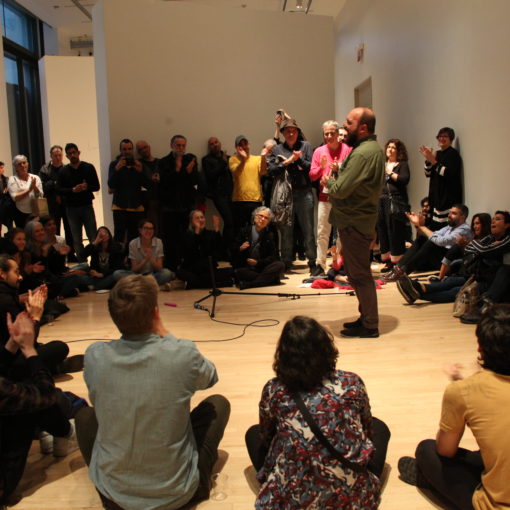By Sean Gerrity
First of all, don’t start the title of any public scholarship with “on” or “toward.”
At the 2019 Modern Language Association Annual Convention I had the opportunity to participate in a new, unique, and quite challenging session format, which MLA called “Humanities in Five: A Contest.” There were eight presenters, and we each had exactly five minutes to “pitch” our research to a general audience, TED Talk-style. The contest was hosted by Inside Higher Ed co-founder and editor Scott Jaschik and was judged by two local Chicago-area journalists.
I spent more time preparing for this five-minute presentation than I have ever spent preparing for a 15 or 20 minute “traditional” conference paper. As it turns out, there is nothing intuitive about tailoring and presenting one’s scholarly research to a general audience. In fact, almost everything we are trained to do as graduate students prepares us not to be able to effectively communicate our research to non-specialists.
The Humanities in Five experience, and the subsequent thinking I’ve done about public scholarship in general, have provided me some insight into how scholars might consider appropriately pitching and tailoring their research to reach a broader, public audience. A lot of this seems like common sense to me now, and it might sound like common sense to you, but I’ve found that most of it actually requires a great deal of sustained work and attention to sink in.
Find one thing that everyone will be familiar with and situation your work in relation to it.
 My research focuses on representations of maroons and marronage in antebellum American anti-slavery literature. Maroons are enslaved people who took flight from bondage and found some measure of freedom by establishing themselves, sometimes temporarily and sometimes permanently, in secluded places like swamps and forests.
My research focuses on representations of maroons and marronage in antebellum American anti-slavery literature. Maroons are enslaved people who took flight from bondage and found some measure of freedom by establishing themselves, sometimes temporarily and sometimes permanently, in secluded places like swamps and forests.
That’s a short explanation for you. But I’ve learned that when talking about my research with non-academics, I’ve needed to find a “hook,” or something most people are already familiar with before I introduce how my research relates to it. When I want to introduce my research to a general audience, I’ll usually begin by drawing them in with what they already know. I’ll say something like, “You probably know about the Underground Railroad as a way that enslaved people escaped to freedom during the era of slavery in the United States. But I study a different kind of freedom that enslaved people sought out, one where they ran away but remained in the South, hiding out in the depths of swamps and forests and sometimes forming communities. And I look at how writers during the early-to-mid 1800s depicted maroons and this different kind of freedom in literature.”
If your research relates in some way to “current events” (which, I think, everyone’s does if we think hard enough and broadly enough about it), this can be another way to “hook” audiences, readers, and publishers, by presenting your research as having some kind of immediacy and urgency.
Consolidate your work around one argument that’s easy to latch onto.
This is actually a piece of advice that I first picked up from reading William Germano’s From Dissertation to Book (2013). He suggests that one major pitfall writers face in making this  transition is trying to make too many arguments at once rather than settling on one clear, major intervention the book is attempting to make and then making it. The same advice is crucial when trying to reach a general audience with your scholarly work. Establishing one clear, memorable argument and then signaling back to it as the thread that connects everything else thereafter ensures that what you are saying is easily followable and digestible. Aim for one clear, obvious, informative, and provocative takeaway.
transition is trying to make too many arguments at once rather than settling on one clear, major intervention the book is attempting to make and then making it. The same advice is crucial when trying to reach a general audience with your scholarly work. Establishing one clear, memorable argument and then signaling back to it as the thread that connects everything else thereafter ensures that what you are saying is easily followable and digestible. Aim for one clear, obvious, informative, and provocative takeaway.
Think outside disciplinary silos.
It can be useful to think about which disciplinary angle to privilege when you pitch your research outside the academy. My PhD is in English, but I tend to privilege the history angle because everyone feels––rightly or not––that they have some sense of “history” (it’s just stuff that happened in the past, right?). The same cannot be said of literature, or Literature, which often elicits a knee-jerk feeling of pretentious distance and deliberate obfuscation. Rather than get condescending about this fact, I’ve tried to embrace it, because it allows me the chance to try to articulate the importance of literary historical scholarship not just for scholars, but for public knowledge production and consumption.
No jargon whatsoever.
People feel compelled to read something when they are made to feel already included or “in the know” in some small way. Jargon is exclusionary.
 Don’t think jargon just means “deterritorialization” and “liminality” and “subtend” (just say no to “subtend” anyway); to those outside the academy, things that we accept as total commonplaces (such as periodizations like “antebellum” or “early modern”) appear as jargon, and jargon is the absolute enemy when attempting to reach the public. For example, I wouldn’t use “antebellum” to describe the time period my research focuses on; instead, I would say something like “in the decades leading up to the American Civil War in 1861.” Even periodizations like “Renaissance Italy” and especially “early modern” are jargon without brief explanation. It always helps to just be more specific and descriptive: e.g., “Italy during the cultural and artistic renaissance in the 1500s.”
Don’t think jargon just means “deterritorialization” and “liminality” and “subtend” (just say no to “subtend” anyway); to those outside the academy, things that we accept as total commonplaces (such as periodizations like “antebellum” or “early modern”) appear as jargon, and jargon is the absolute enemy when attempting to reach the public. For example, I wouldn’t use “antebellum” to describe the time period my research focuses on; instead, I would say something like “in the decades leading up to the American Civil War in 1861.” Even periodizations like “Renaissance Italy” and especially “early modern” are jargon without brief explanation. It always helps to just be more specific and descriptive: e.g., “Italy during the cultural and artistic renaissance in the 1500s.”
Having non-academics read or listen to your work will help you recognize just how much of what we accept as normal discourse is actually jargon from the outside, which brings me nicely to my next and final point.
Talk to non-academics or academics far afield from you, and see what they find most intriguing about your research.
It is possible for some good to come out of the dreaded conversations about your research with relatives at holidays. Instead of deflecting questions from generally well-meaning relatives or friends, I’ve turned these moments into opportunities to figure out what people latch onto when I describe my research to them. For most people, it’s the fact that maroons existed in the first place. It’s fascinating on its face to many people because it complicates their preconceived notions about the Underground Railroad as the primary means of attempted escape for enslaved people in the United States.
escape for enslaved people in the United States.
I’m still thinking and learning more every day about how to frame and produce my scholarly arguments for a broader public audience and consumption. It is and must be an ongoing process, and I have found academic Twitter in particular to be a generative place to connect with colleagues interested in doing the same kind of work. The historians Kevin M. Kruse (@KevinMKruse), Kevin Gannon (@TheTattooedProf), and Kevin M. Levin (@KevinLevin), especially, have been modeling ways to engage the public with history in a time when much of the public has become suspicious of what historians do. But this is also a time when we are urgently in need of the voices of a diverse array of scholars (just not historians named Kevin) to intervene in debates about how thinking critically about history can inform political debates in our present moment.
I really believe that all of our scholarship, no matter how seemingly esoteric, has potential value in public discourse and debate. Even more importantly, though, we as scholars must (re)imagine ourselves as positioned to intervene in public discourse. The notion that the academy, academics, and academic scholarship are apart from “the public” remains alive and well, but this has always been a false distinction and oversimplification that we can and should actively work against.
LINKS
Video of the Humanities in Five Contest at MLA 2019
The Chronicle of Higher Education: “The MLA Gets Practical: Less Theory, More Profession” by Leonard Cassuto
 Sean Gerrity is Assistant Professor of English at Hostos Community College, CUNY and earned his Ph.D. in English from The Graduate Center in 2017. His peer-reviewed scholarship has appeared in MELUS: Multi-Ethnic Literature of the United States and his public-facing scholarship has been featured on WAMU Radio’s “The Academic Minute” (syndicated with NPR) and in Inside Higher Ed. He presents regularly at the MLA convention and will be there in 2020 in Seattle talking about conducting research with a heavy teaching load. Follow him on Twitter at @g3rrity.
Sean Gerrity is Assistant Professor of English at Hostos Community College, CUNY and earned his Ph.D. in English from The Graduate Center in 2017. His peer-reviewed scholarship has appeared in MELUS: Multi-Ethnic Literature of the United States and his public-facing scholarship has been featured on WAMU Radio’s “The Academic Minute” (syndicated with NPR) and in Inside Higher Ed. He presents regularly at the MLA convention and will be there in 2020 in Seattle talking about conducting research with a heavy teaching load. Follow him on Twitter at @g3rrity.







